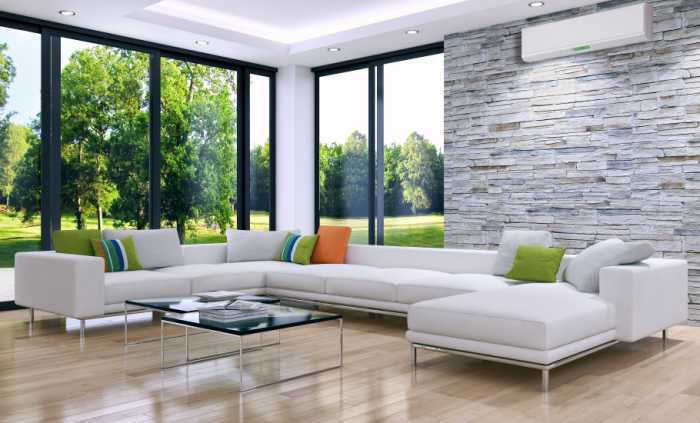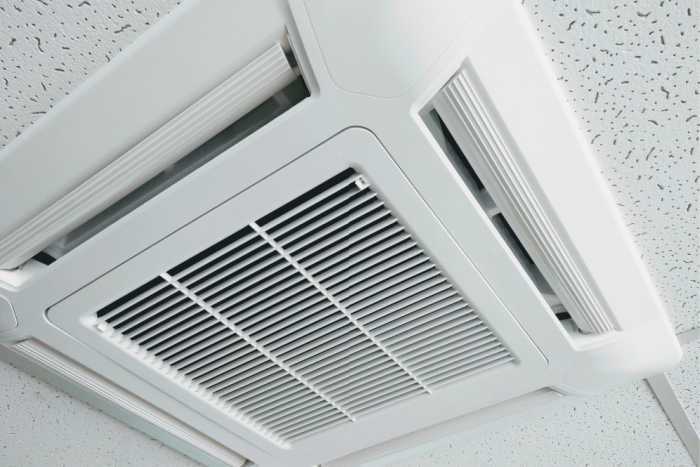Whether it's centralised air conditioning installed in a commercial building or a domestic air source heat pump, it’s important to know the facts about your AC system to get the most out of it. Unfortunately, there’s a lot of myths out there around maximising AC efficiency, most of which can actually see your energy use increase (and subsequently your bills go up).
With that in mind we’ve pulled together the most common air conditioning myths to set the record straight and help you run your system as efficiently as possible.
When it comes to air conditioning, bigger does not always mean better. It might seem logical to assume that a high capacity system will be more effective but it all depends on the space it’s intended to cool.
If an air conditioner has a high capacity - rated for a larger space than you have - it will waste energy. It will continuously switch on and off, eventually wearing itself out and becoming unreliable. Conversely, if an air conditioner is rated for a smaller space than you have it will also work too hard to cool the air, struggle to meet the thermostat’s demands and wear out faster.
What you want is an appropriately sized system with a high energy efficiency rating. This will ensure optimum performance and lower your energy consumption over the lifetime of the unit.

It’s true that square footage is a key factor when sizing an air conditioning system, but it is far from the only element involved in determining the cooling needs of a property.
Other factors to take into account include the number of windows, the directions they face and whether they are single, double or triple glazed. Ceiling heights and insulation are also influential. There are even more considerations in a business environment. In an office space for example, you’ll need to factor in typical occupancy and any heat generating equipment like computers, printers and photocopiers.
Ultimately, you need a qualified engineer to assess the space and recommend an accurately sized system suited to it.
When you think about the energy efficiency of your system, thermostat placement may not cross your mind - but it does have an impact.
When fixed, it should ideally be positioned on an internal wall away from direct sunlight, draughts, entrances, windows and skylights. All of these things can cause a thermostat to gauge an incorrect temperature, forcing your AC system to work harder than necessary.
You should also never assume that a well placed thermostat is always accurate. Thermostats can misread temperatures for all sorts of reasons, and it may be that recalibration is necessary. Check in on the temperature display every once in a while and if something feels off contact an engineer.
This is technically true but it’s best avoided. Not only will it put stress on your unit to reach the temperature rapidly (particularly on hotter days), but you also won’t be cooling the room to a consistently comfortable temperature.
If the thermostat is set too low for a long period of time the system will attempt to maintain this low temperature, which means the compressor will be constantly working harder than it needs to, wasting energy in the process.
As appealing as a surge of cold air may be at times, you’re far better off reducing the temperature slowly to create the ideal conditions.

Again, this might seem logical, similar to shutting off radiators in unused rooms. However, when installed ducted systems are designed to distribute air evenly throughout a property. This means that even if you close vents, the system will still work to the set capacity, using the same amount of energy.
Closing vents can also trap air inside the ductwork, increasing pressure and causing air leaks (which will in turn lessen system efficiency). So, if you wish to improve the performance of a ducted system it’s best to leave the vents open and instead discuss different operating modes with an engineer.
The savings that come from regular maintenance of your air conditioning are real. These systems have many component parts that are subject to wear and tear. They also have parts that need to be cleaned or replaced regularly, like filters.
Neglecting maintenance often sees minor issues escalate into bigger problems that affect system efficiency and cost more money to repair. In some cases you may experience complete system failure, and this typically happens when you need your air conditioning the most.
A proactive approach is always best. In a domestic setting, clean your AC regularly and book in an annual service with a qualified engineer. For business AC, take out a planned preventative maintenance contract based on the specific application of your system.
